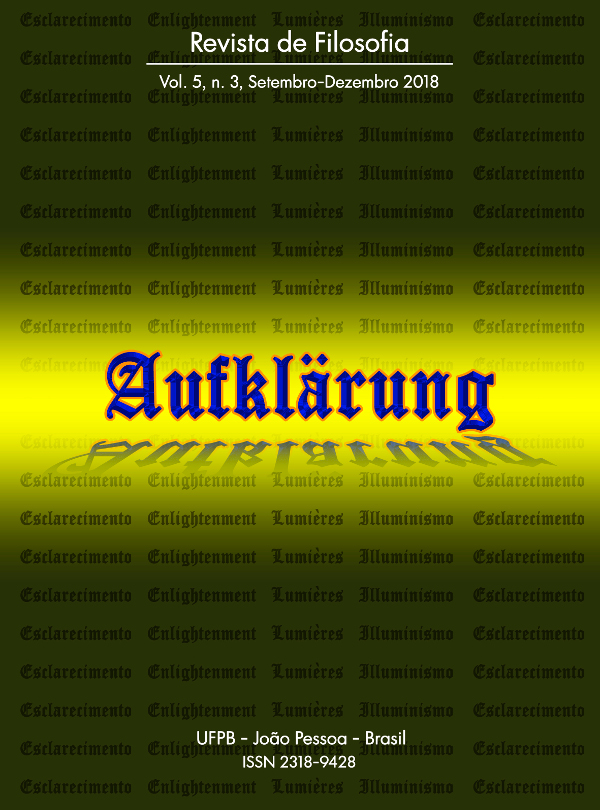The problem of the order of the conjuncts in the coordinating conjunction ‘and’: A logical-syntactic solution
DOI:
https://doi.org/10.18012/arf.2016.43729Palavras-chave:
logic, mental models, semantics, syntax, temporal operatorResumo
From the mental models theory, it has been claimed that the conjunction commutativity law, that is, the logical law providing that the order of the conjuncts joined by the coordinating conjunction ‘and’ can be changed without modifying the truth-value of the sentence, is not always valid in real conversations in natural language. For this reason, based on that very theory, it has been proposed that the true sense of a sentence of that kind can only be suitably captured by a semantic theory, such as the one of the mental models, which resorts to iconic possibilities describing reality. However, in this paper, it is argued that the formal and basically syntactic frameworks can also correctly stand for the actual meaning corresponding to propositions with a coordinating conjunction such as ‘and’ to which the conjunction commutativity law does not seem, in principle, to apply. To do that, they do not have to significantly move away from classical logic, but only to add to the connectives in this last logic a modal operator akin to ‘Next’ in temporal logic, and this without the need to assume many more temporal logical elements.Downloads
Referências
BRAINE, M. D. S.; O’BRIEN, D. P. (eds.). Mental Logic. Mahwah, NJ: Lawrence Erlbaum Associates, Inc., Publishers, 1998a.
BRAINE, M. D. S.; O’BRIEN, D. P. The theory of mental-propositional logic: Description and illustration. In: BRAINE, M. D. S; O’BRIEN, D. P. eds. Mental Logic. Mahwah, NJ: Lawrence Erlbaum Associates, Inc., Publishers, pp. 79-89, 1998b.
DEAÑO, A. Introducción a la lógica formal. Madrid, Spain: Alianza Editorial, 1999.
GENTZEN, G. “Untersuchungen über das logische Schließen I.” Mathematische Zeitschrift, 39(2): pp. 176-210, 1934.
GENTZEN, G. “Untersuchungen über das logische Schließen II.” Mathematische Zeitschrift, 39(3): pp. 405-431, 1935.
GRICE, H. P. Studies in the Way of Words. Cambridge, MA: Harvard University Press, 1989.
JOHNSON-LAIRD, P. N. “Against logical form.” Psychologica Belgica, 50(3/4): pp. 193-221, 2010.
JOHNSON-LAIRD, P. N. Inference with mental models. In: HOLYOAK, K. J.; MORRISON, R. G. eds. The Oxford Handbook of Thinking and Reasoning. New York, NY: Oxford University Press, pp. 134-145, 2012.
JOHNSON-LAIRD, P. N.; KHEMLANI, S.; GOODWIN, G. P. “Logic, probability, and human reasoning.” Trends in Cognitive Sciences, 19(4): pp. 201-214, 2015.
KHEMLANI, S.; BYRNE, R. M. J.; JOHNSON-LAIRD, P. N. “Facts and possibilities: A model-based theory of sentential reasoning.” Cognitive Science, 42(6): pp. 1887-1924, 2018.
KHEMLANI, S.; HINTERECKER, T.; JOHNSON-LAIRD, P. N. “The provenance of modal inference.” In: GUNZELMANN, G.; HOWES, A.; TENBRINK, T.; DAVELAAR, E. J. eds. Proceedings of the 39th Annual Conference of the Cognitive Science Society. Austin, TX: Cognitive Science Society, pp. 259-264, 2017.
LÓPEZ-ASTORGA, M. “Análisis de la tarea de selección por medio de una semántica temporal.” Praxis Filosófica, 38: pp. 53-70, 2014.
LÓPEZ-ASTORGA, M. “The disjunction introduction rule: Syntactic and semantic considerations.” Pragmalingüística, 23: pp. 141-149, 2015.
LÓPEZ-ASTORGA, M. “Logic, pragmatics, and types of conditionals.” Frontiers of Philosophy in China, 11(2): pp. 279-297, 2016.
OAKHILL, J.; GARNHAM, A. (eds.). Mental Models in Cognitive Science. Essays in Honour of Phil Johnson-Laird. Hove, UK: Psychology Press, 1996.
O’BRIEN, D. P. Mental logic and irrationality: We can put a man on the moon so why can´t we solve those logical reasoning problems? In: BRAINE, M. D. S.; O’BRIEN, D. P. eds. Mental Logic. Mahwah, NJ: Lawrence Erlbaum Associates, Inc., Publishers, pp. 23-43, 1998.
O’BRIEN, D. P. “Conditionals and disjunctions in mental-logic theory: A response to Liu and Chou (2012) and to López-Astorga (2013).” Universum, 29(2): pp. 221-235, 2014.
ORENES, I.; JOHNSON-LAIRD, P. N. “Logic, models, and paradoxical inferences.” Mind & Language, 27(4): pp. 357-377, 2012.
PEIRCE, C. S. Collected papers of Charles Sanders Peirce. HARTSHORNE, C.; WEISS, P.; BURKS, A. eds. Cambridge, MA: Harvard University Press, 1931-1958.
VÁZQUEZ, M. “Breve introducción a la lógica temporal.” Revista Laguna, 9: pp. 187-198, 2001.
WASON, P. C. Reasoning. In: FOSS, B. comp. New Horizons in Psychology. Harmondsworth (Middlesex), UK: Penguin, pp. 135-151, 1966.
WASON, P. C. “Reasoning about a rule.” Quarterly Journal of Experimental Psychology, 20: pp. 273-281, 1968.
Arquivos adicionais
Publicado
Como Citar
Edição
Seção
Licença
Política de Direito Autoral para os itens publicados pela Revista:
1.Esta revista é regida por uma Licença da Creative Commons aplicada a revistas eletrônicas. Esta licença pode ser lida no link a seguir: Creative Commons Attribution 4.0 International (CC BY 4.0).
2.Consonante a essa politica, a revista declara que os autores são os detentores do copyright de seus artigos sem restrição, e podem depositar o pós-print de seus artigos em qualquer repositório ou site.
Política de Direito de Uso dos Metadados para informações contidas nos itens do repositório
1. Qualquer pessoa e/ou empresa pode acessar os metadados dos itens publicados gratuitamente e a qulquer tempo.
2.Os metadados podem ser usados sem licença prévia em qualquer meio, mesmo comercialmente, desde que seja oferecido um link para o OAI Identifier ou para o artigo que ele desceve, sob os termos da licença CC BY aplicada à revista.
Os autores que têm seus trabalhos publicados concordam que com todas as declarações e normas da Revista e assumem inteira responsabilidade pelas informações prestadas e ideias veiculadas em seus artigos, em conformidade com a Política de Boas Práticas da Revista.






































